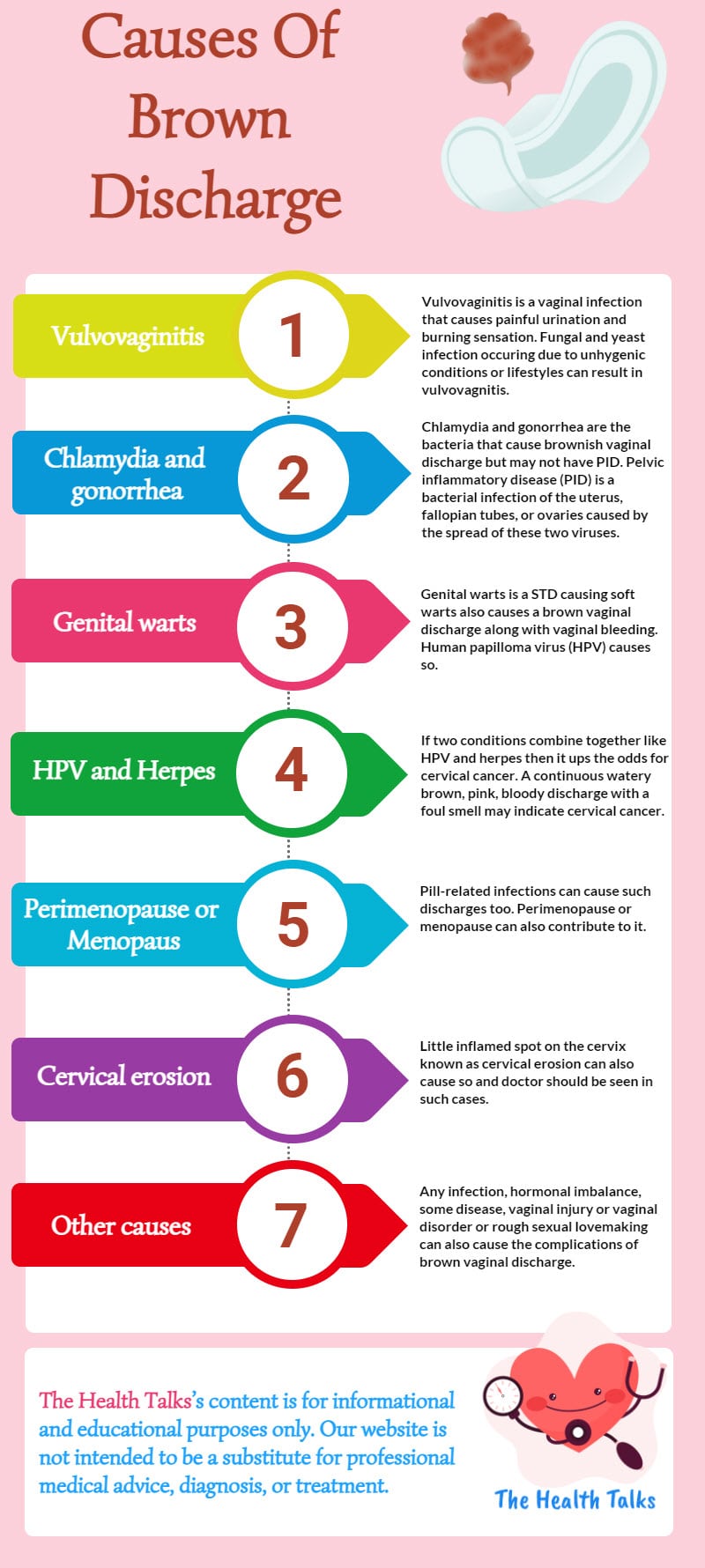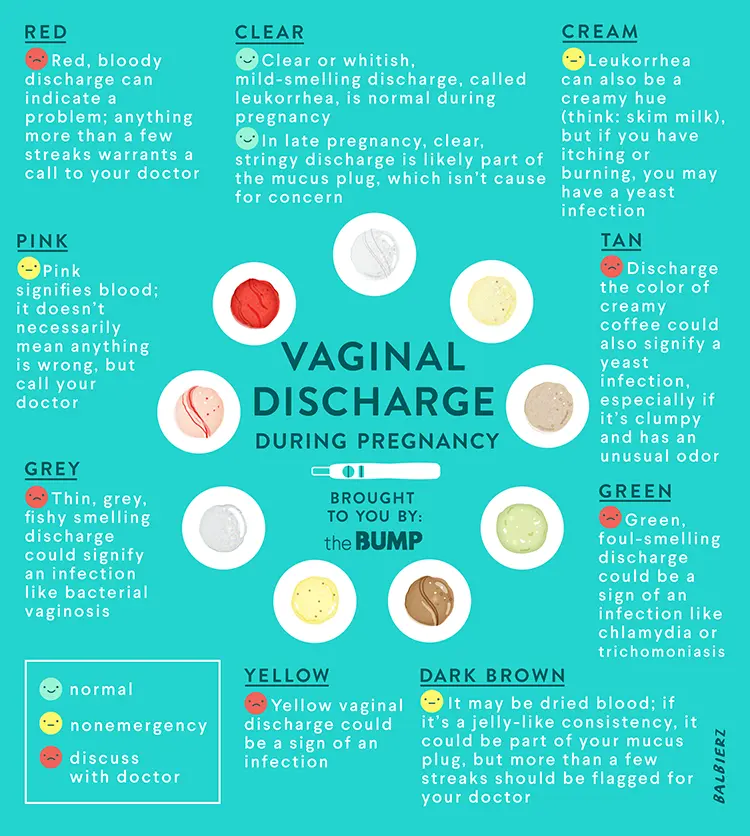Brown Discharge At 19 Weeks Pregnant
Brown Discharge At 19 Weeks Pregnant - Bleeding or brown discharge can be a sign of vaginal or cervical infection, such as bacterial vaginosis (bv), trichomoniasis, chlamydia, or gonorrhea. When, instead of your normal period, you are greeted by a dark brown discharge and mild cramps, chances are high that you will be pregnant. What causes brown discharge during pregnancy? Having an infection during pregnancy can increase your risk of. This kind of discharge is called implantation bleeding and the slight abdominal. Dark brown discharge during pregnancy could be dried blood leaving your body, underwood explains. Brown discharge is often old blood which has turned from red to brown and is usually nothing to be concerned about, but if it continues, you can seek advice from your. Brown discharge is almost always normal, but in rare cases can signal a miscarriage or other complications.
Bleeding or brown discharge can be a sign of vaginal or cervical infection, such as bacterial vaginosis (bv), trichomoniasis, chlamydia, or gonorrhea. Brown discharge is often old blood which has turned from red to brown and is usually nothing to be concerned about, but if it continues, you can seek advice from your. What causes brown discharge during pregnancy? Brown discharge is almost always normal, but in rare cases can signal a miscarriage or other complications. This kind of discharge is called implantation bleeding and the slight abdominal. When, instead of your normal period, you are greeted by a dark brown discharge and mild cramps, chances are high that you will be pregnant. Dark brown discharge during pregnancy could be dried blood leaving your body, underwood explains. Having an infection during pregnancy can increase your risk of.
What causes brown discharge during pregnancy? Having an infection during pregnancy can increase your risk of. Brown discharge is often old blood which has turned from red to brown and is usually nothing to be concerned about, but if it continues, you can seek advice from your. Bleeding or brown discharge can be a sign of vaginal or cervical infection, such as bacterial vaginosis (bv), trichomoniasis, chlamydia, or gonorrhea. When, instead of your normal period, you are greeted by a dark brown discharge and mild cramps, chances are high that you will be pregnant. Brown discharge is almost always normal, but in rare cases can signal a miscarriage or other complications. Dark brown discharge during pregnancy could be dried blood leaving your body, underwood explains. This kind of discharge is called implantation bleeding and the slight abdominal.
Brown Discharge Is It Normal During Pregnancy?
When, instead of your normal period, you are greeted by a dark brown discharge and mild cramps, chances are high that you will be pregnant. Brown discharge is often old blood which has turned from red to brown and is usually nothing to be concerned about, but if it continues, you can seek advice from your. Bleeding or brown discharge.
Understanding Brown Discharge During The First Trimester Of Pregnancy
This kind of discharge is called implantation bleeding and the slight abdominal. What causes brown discharge during pregnancy? Bleeding or brown discharge can be a sign of vaginal or cervical infection, such as bacterial vaginosis (bv), trichomoniasis, chlamydia, or gonorrhea. Having an infection during pregnancy can increase your risk of. Dark brown discharge during pregnancy could be dried blood leaving.
Brown Discharge In Early Pregnancy (Hindi) Brown Discharge During
What causes brown discharge during pregnancy? Having an infection during pregnancy can increase your risk of. When, instead of your normal period, you are greeted by a dark brown discharge and mild cramps, chances are high that you will be pregnant. Bleeding or brown discharge can be a sign of vaginal or cervical infection, such as bacterial vaginosis (bv), trichomoniasis,.
How to Stop Brown Discharge During Pregnancy? What to Do?
Bleeding or brown discharge can be a sign of vaginal or cervical infection, such as bacterial vaginosis (bv), trichomoniasis, chlamydia, or gonorrhea. Dark brown discharge during pregnancy could be dried blood leaving your body, underwood explains. Having an infection during pregnancy can increase your risk of. What causes brown discharge during pregnancy? Brown discharge is often old blood which has.
How to Stop Brown Discharge During Pregnancy? Dr. Namita
Having an infection during pregnancy can increase your risk of. Dark brown discharge during pregnancy could be dried blood leaving your body, underwood explains. Bleeding or brown discharge can be a sign of vaginal or cervical infection, such as bacterial vaginosis (bv), trichomoniasis, chlamydia, or gonorrhea. Brown discharge is often old blood which has turned from red to brown and.
Yellow Discharge During Pregnancy Possible Causes And Treatment
This kind of discharge is called implantation bleeding and the slight abdominal. Brown discharge is often old blood which has turned from red to brown and is usually nothing to be concerned about, but if it continues, you can seek advice from your. What causes brown discharge during pregnancy? When, instead of your normal period, you are greeted by a.
💖 Brown Vaginal Discharge Types, Symptoms, Causes
This kind of discharge is called implantation bleeding and the slight abdominal. Having an infection during pregnancy can increase your risk of. Brown discharge is often old blood which has turned from red to brown and is usually nothing to be concerned about, but if it continues, you can seek advice from your. Dark brown discharge during pregnancy could be.
7 weeks light brown discharge BabyCenter
What causes brown discharge during pregnancy? When, instead of your normal period, you are greeted by a dark brown discharge and mild cramps, chances are high that you will be pregnant. Bleeding or brown discharge can be a sign of vaginal or cervical infection, such as bacterial vaginosis (bv), trichomoniasis, chlamydia, or gonorrhea. Brown discharge is almost always normal, but.
Brown Discharge Pictures Of Spotting During Pregnancy Implantation
Having an infection during pregnancy can increase your risk of. When, instead of your normal period, you are greeted by a dark brown discharge and mild cramps, chances are high that you will be pregnant. Bleeding or brown discharge can be a sign of vaginal or cervical infection, such as bacterial vaginosis (bv), trichomoniasis, chlamydia, or gonorrhea. Dark brown discharge.
ការហូរទឹករំអិលពណ៌ត្នោតអំឡុងពេលមានផ្ទៃពោះក្នុងត្រីមាសទី 1 ទី 2 ទី 3
This kind of discharge is called implantation bleeding and the slight abdominal. Brown discharge is often old blood which has turned from red to brown and is usually nothing to be concerned about, but if it continues, you can seek advice from your. Brown discharge is almost always normal, but in rare cases can signal a miscarriage or other complications..
Brown Discharge Is Almost Always Normal, But In Rare Cases Can Signal A Miscarriage Or Other Complications.
Dark brown discharge during pregnancy could be dried blood leaving your body, underwood explains. When, instead of your normal period, you are greeted by a dark brown discharge and mild cramps, chances are high that you will be pregnant. This kind of discharge is called implantation bleeding and the slight abdominal. What causes brown discharge during pregnancy?
Having An Infection During Pregnancy Can Increase Your Risk Of.
Brown discharge is often old blood which has turned from red to brown and is usually nothing to be concerned about, but if it continues, you can seek advice from your. Bleeding or brown discharge can be a sign of vaginal or cervical infection, such as bacterial vaginosis (bv), trichomoniasis, chlamydia, or gonorrhea.








